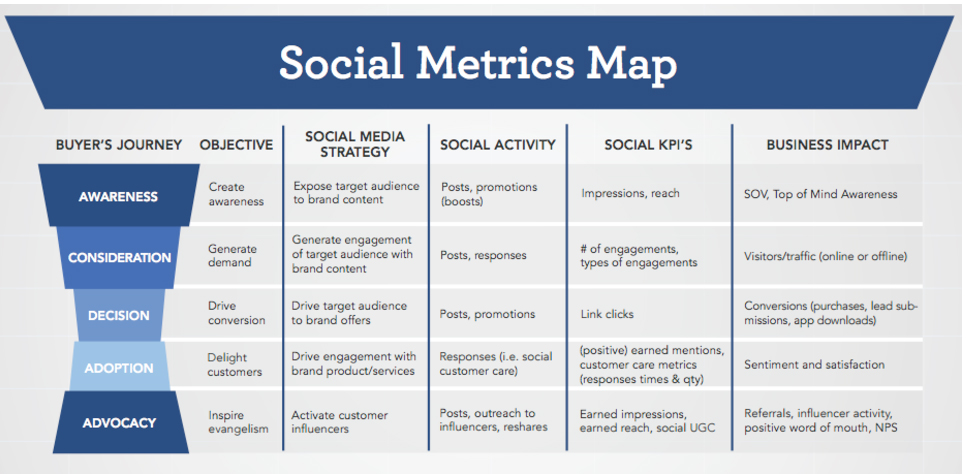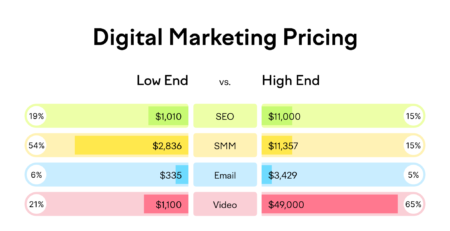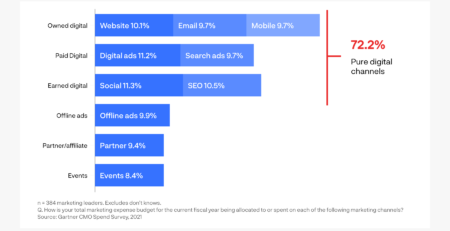How To Measure Digital Marketing Success?
When it comes to digital marketing, success isn’t just about creating eye-catching ads or engaging social media content. It’s also about measuring the results and understanding what’s working (and what’s not). So, how do you measure digital marketing success? Let’s find out!
In today’s digital world, businesses have a plethora of data at their fingertips. But sifting through all that data and extracting meaningful insights can be like searching for a needle in a haystack. That’s where measurement comes into play. By tracking key performance indicators (KPIs) and analyzing the data, you can get a clear picture of how well your digital marketing efforts are performing.
But wait, before we dive into the nitty-gritty of measurement, let’s take a step back and understand why it’s important in the first place. In a nutshell, measuring digital marketing success helps you make data-driven decisions, optimize your campaigns for better results, and ultimately improve your return on investment (ROI). And who doesn’t want that? So, buckle up, because we’re about to embark on a journey to demystify the art of measuring digital marketing success. Let’s get started!
- Define your goals and objectives.
- Identify key performance indicators (KPIs).
- Implement tracking tools, such as Google Analytics.
- Analyze data regularly to measure progress.
- Make data-driven adjustments to your strategy.
By following these steps, you can effectively measure your digital marketing success and optimize your efforts for better results.

How to Measure Digital Marketing Success?
Digital marketing has become an essential component of any business strategy, but how do you know if it’s working? Determining the success of your digital marketing efforts is crucial for making informed decisions and optimizing your marketing campaigns. This article will guide you through the key metrics and strategies for measuring digital marketing success, helping you understand the effectiveness of your campaigns and make data-driven decisions for improved results.
Defining Your Goals
Successful measurement of digital marketing begins with clear and well-defined goals. Before jumping into metrics and analytics, take the time to define what success means for your business. Are you looking to increase brand awareness, generate leads, drive website traffic, or boost sales? Each goal will require different metrics and evaluation methods.
Once you have identified your objectives, break them down into specific, measurable targets. For example, if your goal is to generate leads, define how many leads you want to achieve within a specific timeframe. This will provide a benchmark for measuring success.
Key Metrics for Measuring Success
When it comes to measuring digital marketing success, there is an abundance of metrics available. However, it’s crucial to focus on those that align with your goals and provide meaningful insights. Here are some key metrics to consider:
1. Conversion Rate: This metric measures the percentage of website visitors who take the desired action, such as making a purchase or filling out a form. A higher conversion rate indicates better campaign performance.
2. Cost per Conversion: Also known as Cost per Acquisition (CPA), this metric measures the cost incurred to generate each conversion. It helps you evaluate the efficiency and profitability of your campaigns.
3. Return on Investment (ROI): This metric calculates the profitability of your marketing efforts by comparing the revenue generated to the cost invested. A positive ROI indicates a successful campaign.
4. Click-Through Rate (CTR): This metric measures the percentage of people who click on your ad or email compared to the total number of impressions. A higher CTR indicates better engagement and relevance.
5. Customer Lifetime Value (CLV): This metric calculates the total value a customer brings to your business throughout their lifetime. It helps you analyze the long-term impact of your marketing efforts.
Remember, these metrics can vary depending on your goals and the channels you use. It’s important to select the ones that provide the most relevant insights for your specific objectives.
Evaluating the Customer Journey
Understanding the customer journey is essential for measuring digital marketing success. It involves analyzing the different touchpoints and interactions a customer has with your brand before making a purchase. By mapping the customer journey, you can identify areas where you can optimize your marketing efforts and improve conversions.
Start by tracking the customer’s path from the initial point of contact, such as an ad impression or a social media post, to the final conversion. Use analytics tools to measure the effectiveness of each touchpoint and evaluate the impact on customer behavior and decision-making.
In addition to individual touchpoints, consider the overall customer experience and satisfaction. Monitor customer feedback and reviews to gauge how well your marketing efforts are resonating with your target audience. Positive reviews and high customer satisfaction scores are indicators of success.
Leveraging Data and Analytics
Data and analytics play a crucial role in measuring digital marketing success. There are numerous tools available that can help you collect and analyze data to gain valuable insights. Here are some best practices for leveraging data and analytics:
1. Set up Conversion Tracking: Implement conversion tracking codes on your website to accurately track the desired actions taken by visitors. This will enable you to measure the effectiveness of your campaigns and optimize accordingly.
2. Use Google Analytics: Google Analytics is a powerful tool for tracking website traffic, user behavior, and conversion data. It provides valuable insights that can guide your marketing strategies and decision-making.
3. A/B Testing: Conduct A/B tests to compare different versions of your marketing campaigns and identify the most effective elements. This will help you optimize your campaigns for better results.
4. Create Custom Dashboards: Customized dashboards allow you to visualize and monitor the key metrics that matter most to your business. Use data visualization tools to create informative and easy-to-understand dashboards.
Remember, data is only useful if it is acted upon. Regularly review your data, draw actionable insights, and make data-driven decisions to continuously improve your digital marketing efforts.
The Importance of Continuous Monitoring and Optimization
Measuring digital marketing success is an ongoing process. It requires continuous monitoring and optimization to adapt to changing market trends, consumer behavior, and campaign performance. Here are some tips for continuous monitoring and optimization:
1. Regularly Review and Analyze Data: Schedule regular reviews of your data to identify trends, patterns, and areas for improvement. Use this information to optimize your campaigns and make data-driven decisions.
2. Stay Updated with Industry Trends: Stay informed about the latest trends, technologies, and best practices in digital marketing. This will help you stay ahead of the competition and make informed decisions about your marketing strategies.
3. Test and Iterate: Test different strategies, messaging, and creative elements to identify what resonates best with your target audience. Continuous testing and iteration will help you optimize your campaigns for better results.
Remember, success is not achieved overnight. It requires persistence, adaptability, and a willingness to learn from both successes and failures. By consistently measuring, analyzing, and optimizing your digital marketing efforts, you will be on the path to achieving your goals and driving business growth.
Key Takeaways: How to Measure Digital Marketing Success?
2. Analyzing engagement metrics like click-through rates and bounce rates can help evaluate campaign effectiveness.
3. Monitoring social media engagement and followers can indicate the reach and impact of digital marketing efforts.
4. Tracking customer acquisition cost (CAC) and return on investment (ROI) can provide insights into the financial success of campaigns.
5. Utilizing tools like Google Analytics and marketing automation platforms can help measure and analyze digital marketing performance.
Frequently Asked Questions
Are you unsure of how to measure the success of your digital marketing efforts? Don’t worry, we’ve got you covered. In this section, we’ll address some of the most common questions regarding measuring digital marketing success.
1. What metrics should I consider when measuring digital marketing success?
When measuring digital marketing success, it’s important to consider several key metrics. Some of the most important ones include:
Conversion Rate: Measure how many website visitors or leads ultimately convert into customers. This metric gives you a clear idea of how effective your marketing efforts are in driving conversions.
Return on Investment (ROI): Calculate the return on investment for your digital marketing campaigns. By comparing the amount of money spent on marketing with the revenue generated, you can determine how successful your marketing efforts are at generating profits.
2. How can I track website traffic to measure digital marketing success?
To track website traffic and measure digital marketing success, you can use various tools and technologies:
Google Analytics: Implement this free tool on your website to track and analyze website traffic, visitor demographics, and other valuable insights. It helps you understand how people are finding and interacting with your website.
UTM Parameters: Use UTM parameters in your marketing campaigns to track the source of website traffic. These parameters allow you to identify which specific campaigns or channels are driving visitors to your website.
3. How do I measure the effectiveness of my social media marketing efforts?
Measuring the effectiveness of your social media marketing efforts involves analyzing various metrics:
Engagement: Evaluate the number of likes, comments, shares, and followers gained through your social media marketing. This metric indicates how well your content resonates with your target audience.
Referral Traffic: Use Google Analytics or social media analytics tools to track the amount of traffic that is being directed to your website from social media platforms. This helps you understand the impact social media has on driving visitors to your site.
4. How can I measure the success of my email marketing campaigns?
To measure the success of your email marketing campaigns, consider these metrics:
Open Rate: Determine how many recipients opened your email. This metric gives you an idea of how impactful your subject lines and overall messaging are in engaging your audience.
Click-Through Rate (CTR): Measure how many recipients clicked on links within your emails. A high CTR indicates that your email content is relevant and compelling to your audience.
5. Why is it important to set measurable goals for digital marketing success?
Setting measurable goals is crucial for assessing the effectiveness of your digital marketing efforts:
Accountability: Measurable goals hold you accountable by providing a benchmark to evaluate your progress. They help you identify areas that require improvement and guide your decision-making process for future marketing strategies.
Optimization: Goals act as a guide, allowing you to optimize your marketing efforts. By measuring your progress, you can make data-driven adjustments to your campaigns, ultimately improving their effectiveness and efficiency.
Measuring Marketing Effectiveness: How to Know What’s Working
Summary
Measuring digital marketing success can be challenging, but there are ways to do it effectively. First, set clear goals for what you want to achieve with your digital marketing efforts. Next, track relevant metrics such as website traffic, conversions, and social media engagement. Use tools like Google Analytics and social media analytics to gather data and analyze your performance. Finally, adjust your strategies based on the insights you gain from measuring success.
Remember, success looks different for every business, so it’s important to define your own goals and metrics. By consistently measuring and analyzing your digital marketing efforts, you can make informed decisions and optimize your strategies to achieve better results.











Leave a Reply